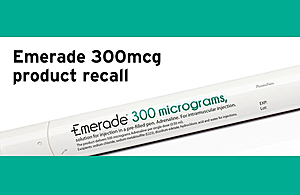Patients informed to exchange Emerade 300 micrograms adrenaline pens for replacement pens of a different brand
Allergy patients who carry Emerade 300 microgram adrenaline auto-injector pens should contact their prescriber and seek replacement pens of a different brand. This applies to Emerade 300 microgram pens that are still in-date as well as those due to expire.

Healthcare professionals are being asked to contact patients who use Emerade 300 microgram pens following notification by the Medicines and Healthcare products Regulatory Agency (MHRA) of a recall of these pens.
The recall is due to reports of difficulty in activating the pens, meaning the dose of adrenaline may not be delivered when needed by a patient for a severe, acute allergic reaction (anaphylaxis).
This action follows a previous recall of Emerade 150 microgram auto-injector pens on 4 March 2020 from patients.
Patients or carers should obtain a prescription from their doctor for alternative pens and should ensure they have two replacement pens to carry with them, before returning the Emerade 300 mcg pens to the pharmacy.
Given the current COVID-19 pandemic, the MHRA in line with NHS guidance, is urging patients who need to return auto-injector pens to minimise additional burden on healthcare professionals and heed the advice on social distancing.
-
a patient or carer should make a telephone appointment with their doctor to request a prescription for replacement pens of a different brand. Unless their doctor advises otherwise, they should not visit the GP surgery in person
-
request the prescription is sent to a pharmacy to avoid collecting in-person from the surgery
-
if a patient and/or their household is self-isolating, ask a friend or relative to collect the replacement pens from the pharmacy. Some pharmacies offer a home delivery service.
-
once the patient has the replacement auto-injector pens return Emerade 300 mcg pens to the pharmacy. Some pharmacies have drop-off boxes to facilitate distancing.
The Emerade auto-injector pens – which come in 150, 300 and 500 micrograms – are being recalled in stages when there are enough supplies of the two alternative brands – EpiPen or Jext.
Patients should continue to carry in-date Emerade 500 microgram pens and use them if needed. Patients should always carry two pens.
The available data show most of the pens will still activate, but more force may need to be applied.
As soon as there are enough replacements for all in-date Emerade 500 microgram pens, patients and prescribers will be informed so they can exchange them for another brand.
A MHRA spokesperson, said:
“Action has been taken to protect patients, following detection of a fault in one component of the Emerade adrenaline auto-injector pens.
“As a result of the fault, some pens may fail to activate and deliver adrenaline. There are now enough supplies of alternate brands to enable a full recall of Emerade 300 microgram pens.
“A patient level recall of Emerade 500 microgram pens will be undertaken as soon as there are enough alternative supplies.
“Patients should return all Emerade 300 microgram pens to their local pharmacy once they have a new prescription and have been supplied with pens of an alternative brand.
“Patients should return Emerade 300 microgram pens as soon as they can, while continuing to follow all social distancing advice.
“It is vital that patients follow existing advice to carry two pens with them at all times and to contact their doctor when a replacement is due.
“When switching to a different brand of adrenaline pen the patient must ensure they are familiar with how to use the pen as each brand is administered differently.”
At present, healthcare professionals are unlikely to be able to help with face to face training but there may be opportunities for remote consultations. Patients must take particular care to read the instructions on how to use the pen which are in the leaflet contained in the box.
The manufacturers’ websites for each brand of pen have information and training videos on how to use a specific pen. Trainer pens can be obtained from the manufacturer and patients are strongly urged to get these so they can practise with the new device.
If an Emerade pen does need to be used, it should be pressed very firmly against the thigh. If this does not result in activation, the patient should immediately use their second pen.
Exposure to high temperature may increase the risk of pen failure. Emerade pens should not be exposed to temperatures above 25°C, such as being placed near to a radiator or fire.
More detailed information for patients is available on the MHRA website.
Information in relation to Coronavirus (COVID-19) when a prescription is needed for replacement pens, based on the current UK Government guidelines for social distancing:
-
patients should follow the advice of their local GP practice/hospital and only attend when instructed to do so. Telephone appointments should be sought where possible. Further information can be obtained on the government website
-
healthcare professionals dispensing medicines should ensure vulnerable patients can still obtain their replacement auto-injectors, considering the use of delivery services where appropriate
-
although pens should be returned to a pharmacy once a replacement is obtained, this should not require someone who is self-isolating to leave their home
-
at the present time, patients and carers may be unable to visit a healthcare professional to receive training in use of the new device. They must take particular care to read the instruction leaflet on how to use the pen. Patients and carers should also read the training information for their new pen on the manufacturer’s website.